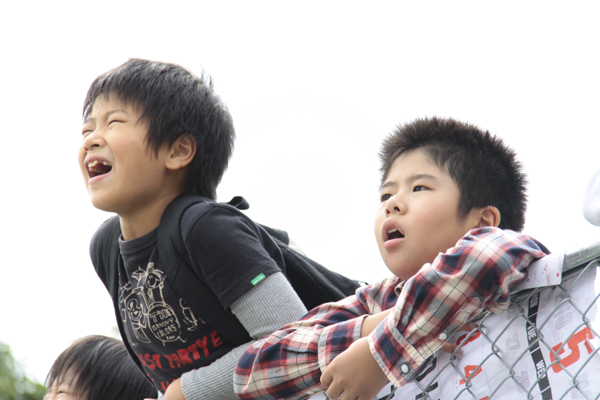
Koki Maeda, left, and Ohshiro Maeda in I WISH (Magnolia Pictures)
Never for a moment did I think that the two boys at the heart of Hirokazu Kore-eda’s simply told and layered film I Wish were actors. Granted, they are real-life brothers, and they were bound to have brought something of that relationship to the fictional scenario (hey, whatever works). Yet the pre-adolescent Maeda brothers are show biz pros—in Japan they are known as comedians. But the sense that you’re watching a film naturally unfold at its own pace and tempo, like a documentary, continues even when the adult members of Kore-eda’s impressive repertory of actors make an appearance. They’re not intruders; they blend right in. Two of them starred in another beautiful family drama of his, Still Walking, and he also directed a then-14-year-old Yuya Yagira in a Cannes-winning role in the tragic kids-centric Nobody Knows. Kore-eda is a true actor’s director.
Scenes unhurriedly and organically unfold around the lives of a fractured family. Perhaps best of all, this truthful depiction of preadolescence refrains from overlaying the film with lessons. Koichi (Koki Maeda) lives with his mother and his grandparents in Kagoshima, under the shadow of the ash-spewing volcano Sakurajima. (Koichi can’t figure out why everyone in the city is calm at the not-so-remote possibility of death and destruction). His younger brother Ryu (Ohshiro Maeda), short for Ryunosuke, has moved away to live with their dad 380 miles away in Fukuoka. Though he’s older, 12-year-old Koichi is not as independent as Ryu. Koichi is the one to reach out to his brother and make the daily cell phone calls. Though he has new friends and a paternal teacher, he clings to the hope that his divorced parents will get back together and all four will return to a life in Osaka. But interestingly, that doesn’t necessarily make him the more sensitive of the two.
You’ll have no trouble telling apart the brothers’ parallel storylines—the change in tempo in each is set by the boys’ rhythms. Whereas Koichi is quiet and dutiful, Ryu barrels through the film. Watching him is so energizing it’s like drinking a 16-ounce coffee with an extra shot of espresso. He’s in a state of perpetual motion. Without a doubt, he’s the natural ringleader among his friends, and unlike the older Koichi and his prepubescent pals, girls are allowed into Ryu’s club.
After school, Ryu dashes down the city streets on the way home, where he, in a moment of calm, eats his takeout order alone—having the house to himself suits him fine; his family memories differ from Koichi’s. Realistic and pragmatic, he remembers the folks fighting at the dinner table and his mother’s volatility. Now living with his wannabe rock star dad, he grows his own garden and runs the household. He’s the early bird who wakes a hung-over dad in the morning.
Rumor has it among Koichi’s friends that if you make a wish at the exact moment that the two new bullet trains connecting Kagoshima and Fukuoka speed by each other, your wish will come true. For Koichi, that would be for the volcano to erupt, destroying the city and forcing his mom to take dad back. (In fact, the film’s Japanese title means “miracle.”) Ryu agrees to his brother’s plan to skip school and take the train out to the boonies to see him, but only out of obligation. His friends even write a script for him so he knows what to say to Koichi; he knows his brother wants the family back together, but he likes taking care of his dad in Fukuoka. But back to the scheme, how will the brothers and their friends pay for the train trip? Or explain to their parents where they’ve been overnight?
Maybe the view of childhood here is idyllic; there’s no Internet, video games, or Amber alerts. Remarkably, there’s a sense of communal responsibility for children that would be suspect, at least in most American cities. Opening your door to a group of unfamiliar kids would be preceded with caution in our world, but not necessarily in Kore-eda’s. Compared to American kids, whose schedules are so micro-managed with little time for independence, those of I Wish run wild and free. Nevertheless, adolescents will identify with either brother or their friends, each with his/her own aspiration, and adults will be more attuned to the film’s diffused point of view and observational tone. I Wish follows another strong film this spring, Monsieur Lazhar, whose appeal also breaks down age barriers.
















Leave A Comment